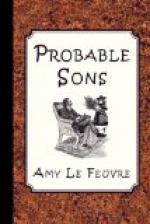Sir Edward was soon out of danger, but he was a long time recovering, and required most careful nursing. Milly begged and entreated to go in and see him, but this was not allowed. At last permission was given by the doctor for a very short visit, and the child stole in on tip-toe, but insisted upon taking a large brown paper parcel in with her, the contents of which were unknown to all except herself.
Softly she crept up to the bed and looked at her uncle’s bandaged head and worn face with the greatest awe.
He put out his hand, which she took in hers, and then she said, her brown eyes fixed wistfully on his face,—
“I’ve wanted to see you, Uncle Edward, for so long. I wish you would let me come in and help to nurse you.”
Sir Edward smiled, then shook his head.
“I’ve been asking God to make you better so many times,” she continued, softly stroking his hand as she spoke, “and He is going to make you live again; now isn’t He? I wasn’t quite sure whether you mightn’t like to die best, but I didn’t want you to. Nurse says I mustn’t stay a moment, but I’ve brought you a present. Maxwell went to the town and got it for me with the money Jack sent back to me. May I open it for you?”
Reading assent in his eyes, Milly eagerly removed her brown paper, and then lifted on to the bed with difficulty a picture of the Prodigal Son, in a plain oak frame.
“Isn’t it a lovely one, Uncle Edward? There’s the prodigal son—I’ve learned to say it properly now—all in rags hurrying along the road, and there’s his old father in the distance coming to meet him; and can you see the words underneath?—’I will arise and go to my father, and will say unto him, Father, I have sinned against Heaven, and before thee.’ I thought you would like it to look at while you are in bed. May I rest it against the rail at the bottom of your bed?—then you can see it beautifully.”
Nurse came forward and helped the child to put the picture in the place she wished; and Sir Edward tried to look pleased, and said in a low tone,—
“Thank you, little one, I can see it well from there”; but under his breath he muttered, “Has she a purpose in bringing that everlasting subject before me? I’m sick to death of it. I shall get rid of that picture when she is gone.”
But he did not. His eyes grew somewhat wistful as he gazed upon it, and later in the day, when nurse asked him if he would like to have it removed, he shook his head in the negative.
No one could know his thoughts during those long days and nights of weariness and pain. The restlessness of body did not equal the restlessness of soul, and the past came back with a startling vividness. The wasted years, the misused talents, and above all, the fast-closed heart against its rightful Owner, now seemed to stand up in judgment against him. Often in his wretchedness would he groan aloud, and wish for unconsciousness to come to his aid and consign to oblivion his accusing memory.




